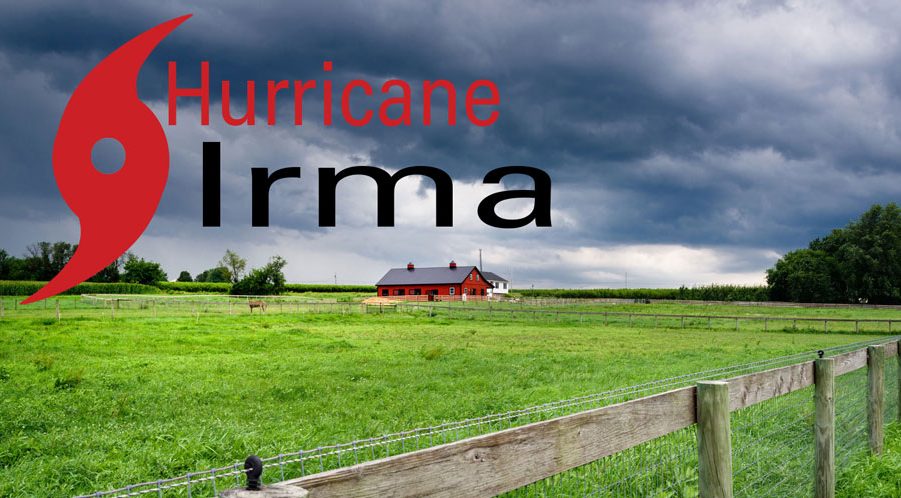Hurricane Irma Preparedness: Tips for Animal Owners

A state of emergency has been declared for all of North Carolina as the powerful Category 5 Hurricane Irma barrels toward Florida with a projected path up the East Coast.
People are encouraged to remain vigilant and monitor the shifting track of the hurricane, which has maximum sustained winds of up to 180 miles per hour. The storm is projected to maintain Category 5 status as it approaches Florida. Irma could make landfall in southeastern Florida by early Sunday.
It is then projected to make a second landfall in South Carolina Sunday night. North Carolina will likely feel the impact of Irma Sunday night and throughout the day Monday and Tuesday.
North Carolina State University’s College of Veterinary Medicine, along with the American Veterinary Medical Association and other organizations, have useful information to help animal owners who find themselves in the path of severe weather that may require emergency response or evacuation.
Officials suggest the following:
- Be sure your emergency supplies kit has enough bottled water and non-perishable food to sustain each family member for three to seven days. Include a weather radio, flashlight, extra batteries, toiletries, change of clothes, blankets or sleeping bag, rain gear and appropriate footwear. Also include copies of important documents, such as birth certificates and insurance policies. Go to Ready NC for regularly updated information.
- Plan for your pets. Gather supplies and papers for your pet and put them in an easily-accessible container. One of the most common reasons people get caught in bad weather is because they do not have carriers for cats. Get at least one of the simple cardboard ones if you have nothing.
- Prepare your home. Clean out gutters and drain pipes. Clear your decks and outside of debris, furniture, etc., that could damage buildings in strong winds. Lower/take down elevated bird feeders, lights, etc.
- Determine if you are in a flood-prone area, such as near to a creek or in a low area surrounded by higher ground. You will be at higher risk of water damage. You can go to http://fris.nc.gov/fris/Home.aspx?ST=NC, and enter your address to see what the NC Emergency Management Flood Risk Info System has on your area.
- Establish evacuation routes for your area. Plan on at least two ways out of your area; one might be blocked. If you live with other people, all should know of and agree to congregation meet-up places away from your home, in case you have to evacuate or cannot get to your neighborhood.
- Listen to radio/local TV for advice. Stay tuned to local news for the latest advisories from the National Weather Service and National Hurricane Center (NHC), as well as state and local emergency management officials.
RESOURCES:
COMPANION ANIMALS
If you take pets to an emergency shelter that allows them, you’ll need to have pet supplies, collar with ID, up-to-date veterinarian records, a pet carrier and leash. A picture of the pet is good to have. For identification purposes, it is also recommended that pets be microchipped. If there is no shelter that accepts pets, look for local hotels that allow pets such as those listed at www.petswelcome.com.
- American Veterinary Medical Association: https://www.avma.org/public/EmergencyCare/Pages/Pets-and-Disasters.aspx
- Federal Emergency Management Agency: http://www.ready.gov/hurricanes
- American Red Cross: http://www.redcross.org/prepare/location/home-family/pets
- Aquarium Owners: Greg Lewbart’s Suggestions for Power Outages: https://cvm.ncsu.edu/dealing-with-aquariums-and-ponds-during-power-outages/
LIVESTOCK, HORSES, AND POULTRY
- North Carolina Department of Agriculture and Consumer Services: http://www.ncagr.gov/disaster/Livestock.htm
- Staying or Leaving in the Face of a Disaster Becomes a Critical Consideration for Horse Owners: https://cvm.ncsu.edu/staying-or-leaving-in-the-face-of-a-disaster-becomes-a-critical-question-for-horse-owners
- Horses and Disasters: Planning for the Unthinkable: https://cvm.ncsu.edu/horses-and-disasters-planning-for-the-unthinkable/
Pamphlets for Farm and Ranch Owners Dealing with Flooding
- Flooding & Livestock Owners Preparing, Responding and Recovery
- Flooding & Equine Owners Preparing, Responding and Recovery
ADDITIONAL RESOURCES
- http://www.wral.com/weather or WRAL Channel 5.
- http://www.weather.gov/rah The National Weather Service Forecast Office, Raleigh
- http://tims.ncdot.gov/tims/default.aspx The NC Dept of Transportation Travel Information System. You can also dial 511 to get automated traffic incident information.
- https://www.ncsu.edu/emergency-information The NC State WolfAlert System, for updates on University operations and issues.
- Categories:


